Greek mythology, a cornerstone of Western literature and culture, presents a vivid and captivating universe populated by gods, goddesses, and heroes. These myths not only entertained ancient audiences but also explained natural phenomena, human behavior, and cultural practices. Join us as we delve into the fascinating world of Greek gods, exploring their tales, symbols, and enduring legacy.
1. Zeus: The King of the Gods
Zeus, known as the father of gods and men, is the ruler of Mount Olympus and the god of the sky, lightning, and thunder. Often depicted with a thunderbolt in his hand, Zeus is a powerful figure who maintained order and justice among both gods and humans. His many affairs with goddesses and mortals alike resulted in numerous offspring, including heroes like Hercules and Perseus. Zeus’s rule is marked by his ability to balance power and wisdom, making him a revered and feared deity.
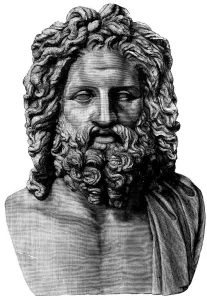
2. Hera: The Queen of the Gods
Hera, Zeus’s wife and sister, is the goddess of marriage and family. Despite her role as the queen of Olympus, Hera is often portrayed as jealous and vengeful, particularly towards Zeus’s many lovers and illegitimate children. However, she also represents the ideal of marital fidelity and protects married women. Hera’s symbols include the peacock and the cow, both signifying her watchful and nurturing nature.

3. Poseidon: The God of the Sea
Poseidon, brother to Zeus and Hades, is the god of the sea, earthquakes, and horses. With his trident, Poseidon could stir the waters and create storms, demonstrating his immense power over the oceans. Sailors prayed to Poseidon for safe voyages, while cities like Athens built temples in his honor. Poseidon’s turbulent nature is often reflected in myths, where he is both a benefactor and a source of natural disasters.
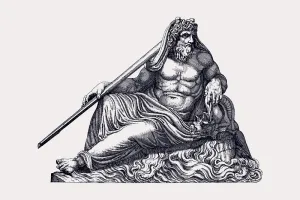
4. Hades: The God of the Underworld
Hades, the brother of Zeus and Poseidon, is the ruler of the underworld and the god of the dead. Often depicted with his three-headed dog, Cerberus, Hades governs the realm of the deceased with a stern but fair hand. His abduction of Persephone and their subsequent marriage explain the seasonal cycle of growth and decay. Despite his grim association, Hades is not evil but rather a necessary force in maintaining the balance of life and death.

5. Demeter: The Goddess of Agriculture
Demeter, the sister of Zeus and mother of Persephone, is the goddess of the harvest, grain, and fertility. Her deep bond with her daughter is central to the myth explaining the changing seasons. When Persephone was abducted by Hades to the underworld, Demeter’s grief caused the earth to become barren. Only when Persephone returned did the land become fertile again. This cycle of life and death is celebrated in the Eleusinian Mysteries, ancient rituals dedicated to Demeter and Persephone.

6. Athena: The Goddess of Wisdom and War
Athena, born from the forehead of Zeus, is the goddess of wisdom, courage, and warfare. Unlike Ares, the god of war, Athena represents strategic warfare and is also associated with crafts and reason. The city of Athens, named in her honor, became a center of learning and culture, reflecting her values. The Parthenon, a magnificent temple on the Acropolis, stands as a testament to her importance in Greek society.

7. Apollo: The God of the Sun, Music, and Prophecy
Apollo, the son of Zeus and Leto, is a multifaceted god associated with the sun, music, poetry, healing, and prophecy. As the twin brother of Artemis, he is often depicted with a lyre, symbolizing his mastery of the arts. Apollo’s oracle at Delphi was one of the most important religious sites in ancient Greece, where people from all over the Mediterranean came to seek his prophetic insights. His role as a healer and a bringer of plague reflects the duality of his influence.
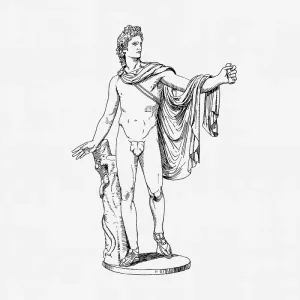
8. Artemis: The Goddess of the Hunt and the Moon
Artemis, Apollo’s twin sister, is the goddess of the hunt, wilderness, and childbirth. She is often depicted with a bow and arrows, accompanied by a deer or hunting dogs. As a virgin goddess, Artemis represents independence and strength, often protecting young women and aiding in childbirth. Her connection to the moon complements her brother Apollo’s association with the sun, highlighting the balance between day and night.

9. Ares: The God of War
Ares, the son of Zeus and Hera, is the god of war known for his aggressive and tumultuous nature. Unlike Athena, who represents strategic and justified warfare, Ares embodies the brutal and chaotic aspects of conflict. His violent tendencies made him unpopular among both gods and humans. Despite his fearsome nature, Ares had a passionate affair with Aphrodite, the goddess of love, producing children who represented both love and strife.
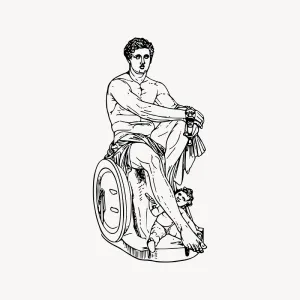
10. Aphrodite: The Goddess of Love and Beauty
Aphrodite, born from the sea foam, is the goddess of love, beauty, and desire. Her influence extends beyond romantic love to include fertility and procreation. Often depicted with doves and roses, Aphrodite’s allure captivates gods and mortals alike. Her numerous affairs, including her marriage to Hephaestus and her liaison with Ares, highlight her complex nature. The tale of her birth and her role in the Trojan War underscores her power and influence.
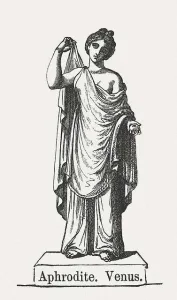
11. Hephaestus: The God of Fire and Blacksmiths
Hephaestus, the son of Zeus and Hera, is the god of fire, metalworking, and craftsmanship. Despite his physical deformity and being cast out of Olympus, Hephaestus is a master blacksmith whose creations include Zeus’s thunderbolt and Achilles’ armor. His marriage to Aphrodite is marked by his ingenuity and resilience. Hephaestus’s workshops, located in volcanoes, symbolize his connection to both destructive and creative forces.
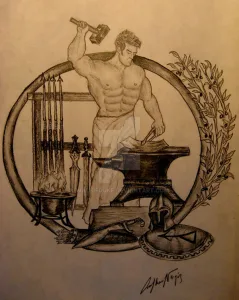
12. Hermes: The Messenger of the Gods
Hermes, the son of Zeus and Maia, is the messenger of the gods, known for his speed and cunning. As the god of travel, trade, and thievery, Hermes is often depicted with winged sandals and a caduceus. His role as a guide for souls to the underworld highlights his versatility. Hermes’s intelligence and wit make him a favorite among gods and mortals, often aiding heroes like Odysseus with his cleverness.
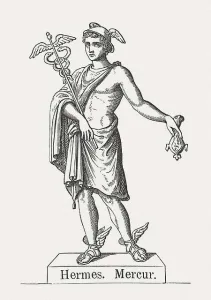
13. Dionysus: The God of Wine and Revelry
Dionysus, the son of Zeus and the mortal Semele, is the god of wine, festivity, and ecstasy. His dual nature as a bringer of joy and chaos reflects the intoxicating effects of wine. Celebrations in his honor, such as the Dionysian festivals, involved music, dance, and theatrical performances. Dionysus’s ability to transcend boundaries between life and death, madness and ecstasy, makes him a complex and fascinating deity.
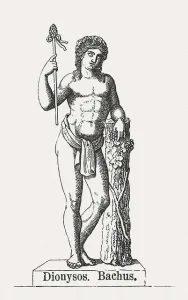
14. Hestia: The Goddess of Hearth and Home
Hestia, the sister of Zeus, is the goddess of the hearth, home, and domestic life. Known for her gentle and nurturing nature, Hestia is the embodiment of stability and family unity. Her eternal flame, kept alive in temples and homes, symbolizes the warmth and safety of the household. As the firstborn of the Olympians, Hestia’s presence is essential in maintaining peace and harmony.
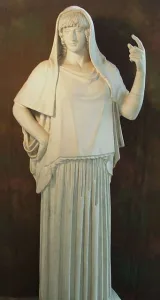
The pantheon of Greek gods offers a glimpse into the ancient Greek worldview, where each deity represents different aspects of life and nature. Their stories, filled with drama, love, and conflict, continue to captivate us, reflecting timeless human experiences and emotions. Through these gods, we explore the complexities of power, wisdom, love, and mortality, making Greek mythology an enduring and enriching part of our cultural heritage. These myths also teach us about virtues and vices: Zeus’s rule underscores the importance of justice and leadership, while his infidelities reveal the consequences of unbridled desire; Athena’s wisdom and strategic prowess contrast with Ares’s destructive aggression, illustrating the balance between intellect and brute force; and Demeter’s maternal devotion emphasizes the value of nurturing and perseverance, even as Hera’s jealousy serves as a cautionary tale against envy. By examining the virtues and vices embodied by these gods, we gain insight into the moral and ethical fabric of ancient Greek society and its relevance to our own lives today.
